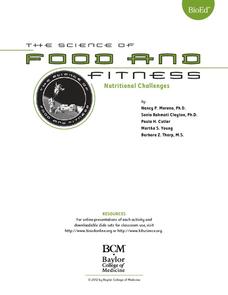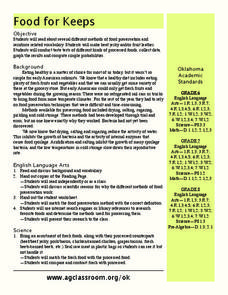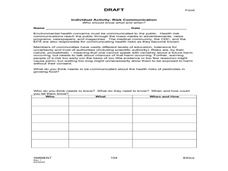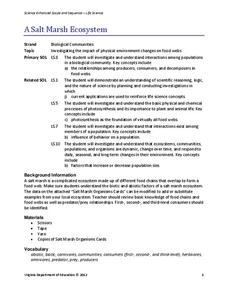BioEd Online
Nutritional Challenges
Eating healthy can be a challenge, especially for people with special dietary needs. After learning about standard nutritional needs for adults, learners take on the role of a dietician and work together to create a menu for one of the...
Baylor College
Your Nutrition Needs
It takes some work to ensure you have a balanced diet, but once you know the types of foods that are good for you, it becomes second nature. In the sixth of seven lessons about energy and nutrition, learners create a healthy eating plan...
Curated OER
Marine Ecosystems
Students identify producers and consumers and construct a food chain from four marine ecosystems. They describe the delicate balance among organisms in each environment. In groups, students discuss the human activities that upset the...
Curated OER
FOOD FOR THE ANCESTORS
Students identify the foods associated with the "Days of the Dead Celebration." They compare and contrast these foods to the foods associated with American celebrations and become familiar with the foods of Mexico and their relationship...
Curated OER
Ecosystem Interactions in Refuges
Seventh graders, using national parks as models, illustrate the energy flow in ecosystems. Working in groups, they use murals, flow charts, or other visual displays to record their findings. Students represent the food chains and webs...
Curated OER
Rainforest Food Chain
Students investigate a rainforest food chain. In this ecology lesson, students are shown pictures of plants and list what animals might eat the plants. Students continue to think of what other animals might eat those animals. Students...
Curated OER
Food Chains and Webs
In this food chains worksheet, students identify the producers and consumers in the given food chains and describe how contaminants can biologically accumulate. This worksheet has 4 short answer questions.
Curated OER
Food Chains and Food Webs
Students discuss the characteristics of producers, consumers and decomposers. Using a flow chart, they construct a food chain to visually show how organisms with different energy sources depend upon one another. Students explore a...
Curated OER
Food Chains
Students create their own food chains on Kidspiration starting from the energy of the sun and what it creates. In this food chains lesson plan, students learn about how insects eat plants and so on.
Curated OER
Food Webs and Chains
Fifth graders examine how simple food chains and food webs function. They examine an illustrated food chain/food web and identify the producers and consumers. Students then sequence pictures of animals into a food web, and create their...
Curated OER
What's on My Plate?
Kids work together in groups to discuss and understand the differences between a typical diet and a healthy one. They use the My Plate recommendations to compare what they eat with what they should be eating according to the MyPlate...
Curated OER
The Food Chain Game - A Lesson in Ecosystems
Learners are divided into three groups, herbivores, omnivores, and carnivores which receive a certain number of lives. Once in their ecosystem (outside or the gym), the carnivores chase and eat either the herbivores or omnivores, the...
Curated OER
Figuring Out Food Labels
High schoolers identify various sources of nutritional information and evaluate accuracy of messages. They comprehend and identify misrepresentations in current food labeling. Pupils evaluate specific consumer products for truth in...
Curated OER
Ecosystem Game
Students examine the ecosystem by playing a game. In this ecosystem lesson, students are put into groups of decomposers, consumers, and producers. Students create a list of animals that fit into each group and items that represent...
Curated OER
The Quicker the Better? Food Processing
Sixth graders evaluate the nutrition of various foods. In this healthy eating lesson, 6th graders discuss the processing of many common foods and what this means. Students identify and research unfamiliar ingredients in processed foods...
Curated OER
Food For Keeps
Students explore food. In this processed and fresh foods lesson, students discover how some foods are processed and how they differ from fresh food. The complete group activities and an individual reading assignment. This lesson includes...
Curated OER
How is Your Food Grown
Students consider how their food is grown due to pesticide use. They reflect on the harm done to the various groups, then discuss the ethical questions from the perspectives of different stakeholders. IN addition, they compile relevant...
Curated OER
Food Safety-Consumers Need the Facts
Students begin by completing a survey asking them to rank their concerns about commercially prepared foods. They develop a definition of relative risk, and complete the "Pro or Con" worksheet. Students work in groups to make a study of...
Virginia Department of Education
A Salt Marsh Ecosystem
What a web we weave. Pupils use yarn as the primary resource to create a web depicting the intricacies of a salt marsh ecosystem. They participate in a question and answer session, which leads to an in-depth facilitated discussion...
National Endowment for the Humanities
Upton Sinclair, Theodore Roosevelt, and Harvey W. Wiley
Though Upton Sinclair's novel The Jungle shocked the American public into a thorough examination of the meat-packing industry, the author was disappointed that his book's main argument—the exploitation of American immigrants—was not...
Baylor College
Energy for Life (Energy from Food)
Energy comes in many forms, but how do living things get the energy they need to survive and thrive? In a simple, controlled experiment with yeast, water, and sugar, groups make observations about how yeast reacts with water alone, then...
Curated OER
My Colorful Food Chain
Students explore biology by participating in a dietary habit activity. In this food chain lesson plan, students discuss their own diets and the animals we feed upon daily. Students create a poster demonstrating the animals that we feed...
Curated OER
Producers, Consumers, and the Food Chain
Third graders discuss producers, consumers, and the food chain. In this producers and consumers lesson, 3rd graders talk about organisms, the food chain, and the difference between producers and consumers. They complete review worksheets...
Curated OER
Arctic Food Web
Students research animals found in the arctic. They discuss what living things need in order to survive and where they get their food. Students discuss the difference between producers and consumers and create a food web for animals in...























